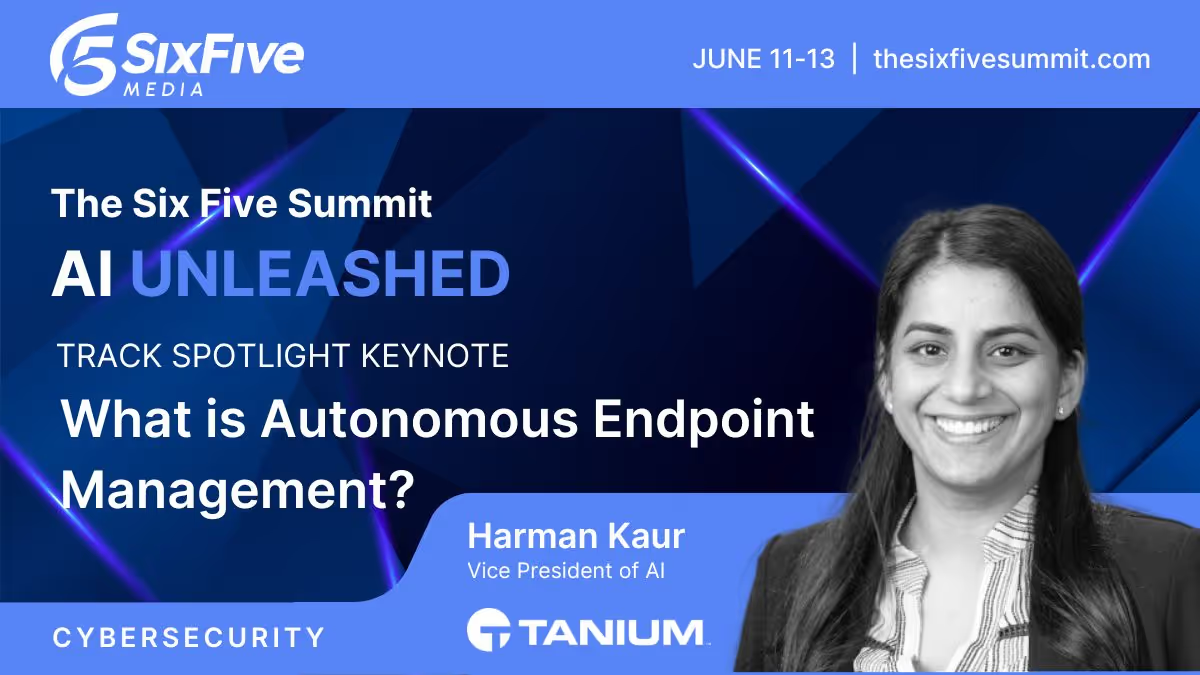Generative AI Gets Competitive: IBM's Real-Time Strategy at the US Open – Six Five On The Road
Ritika Gunnar, GM of Data & AI at IBM, joins Daniel Newman to discuss IBM’s role at the US Open, innovations in AI-powered fan experiences, and how new platforms like watsonx.data and recent acquisitions are enabling enterprise data transformation.
What role has IBM played in the fan experience at the US Open? 🎾
Host Daniel Newman is joined by IBM GM, Data & AI Ritika Gunnar for a conversation on IBM’s technology partnership with the US Open and the company’s expanding leadership in enterprise data and AI solutions, with a key focus on enhanced fan experiences powered by advanced AI and data innovations.
Key Takeaways Include:
🔹AI-Powered Fan Engagement: IBM is introducing new features at the US Open, such as enhanced analytics and interactive AI capabilities, to deepen fan interaction during matches.
🔹Enterprise Data Transformation: Platforms like watsonx.data and IBM’s approach to generative and agentic AI are empowering organizations to derive actionable insights from both structured and unstructured data.
🔹Real-World Automation: Tools like Agent Connect and watsonx Orchestrate are enabling enterprises to streamline operations and automate decision-making, transforming business workflows across various industries.
🔹Strategic Growth: IBM’s acquisition of DataStax underscores a commitment to unifying and leveraging unstructured data at scale, further strengthening the value proposition for enterprise AI applications.
Learn more at IBM.
Watch the full video at sixfivemedia.com, and be sure to subscribe to our YouTube channel, so you never miss an episode.
Or listen to the audio here:
Disclaimer: Six Five On The Road is for information and entertainment purposes only. Over the course of this webcast, we may talk about companies that are publicly traded, and we may even reference that fact and their equity share price, but please do not take anything that we say as a recommendation about what you should do with your investment dollars. We are not investment advisors, and we ask that you do not treat us as such.
Daniel Newman: Hey everyone. The Six Five is On The Road here at Madison Square park in New York City at the US Open IBM activation. What a week the US Open has been going on here outside the city in Flushing. But here in the city, in Madison Square Park, there is a big event today. IBM is partnering with the US Open to bring the tennis experience here in the park. Excited to have a conversation today, not just about the US Open and the work that IBM is doing technologically alongside with the USTA and the Open, but also to talk a little bit about the company's data and AI strategy. Joined by Ritika Gunnar. Great to see you.
Ritika Gunnar: Great to see you, Dan.
Daniel Newman: Thanks for joining me here.
Ritika Gunnar: It's amazing to be here today and look at what an amazing activation place that we have in Madison Square today.
Daniel Newman: Yeah, let's talk a little bit about that. You know, last night, by the way, I went to the match, I got to see a couple of different matches. You know, I left right when Sinner's match started, by the way. So interesting to watch the different strategy, the women's game, Seeing one of the top women's games and seeing the men's game. Women play with so much finesse, the men play with so much power. It seems very typical. But they were both just really entertaining. The energy there was great. You've been around and at the park at the US Open event, I think you told me a few times, I mean, talk a little bit about the act, the activation here, US Open and the partnership with IBM.
Ritika Gunnar: Yeah, well, when you look at the US Open and the many years that IBM has been doing the technology aspects with the US Open, we really this year extended what we were doing with the US Open to provide a lot more of a generative AI experience. So for those of you who use the app, you would have seen that you have things like match channels, chat, where you can actually chat and interact and ask questions about the U.S. open, the players, the matches. You can do things like have a play by play where you have conversational AI really generating insights for you or the real time match insights where during the actual play you can see how AI is making predictions on who the winner is in real time. So all of these things were newly added this year using a lot of the generative AI technologies and you can kind of think of that as a tennis coach for those who may be novice tennis fans or who are really deep experts in IT and just really want to understand the statistics. All of this powered by our IBM technology granite models underneath IBM Watson orchestrate underneath as well. And so this has really been a culmination of just taking technology and further giving a very hyper personalized experience to the fans.
Daniel Newman: Yeah. And you're bringing a lot of that to a number of different sports. You're doing it with tennis, you're doing it with golf, you're doing it with racing.
Ritika Gunnar: Racing and UFCS.
Daniel Newman: And by the way, very interesting. I think it was at Mobile World, or maybe it was at South By. I got to play a table tennis match and I got to do the Tracker, and I was favored to win. I was dominating the table at South By. So I just want to point that out. I am a very good table tennis player here. That's important.
Ritika Gunnar: Does it translate to tennis?
Daniel Newman: It does not. It does not. I'm the guy that thinks I'm playing baseball. You know, I'm trying to just keep it inside the little fence when we play. But. But I do love the sport. I love to watch any sport. I like watching athletes compete. And this was great. And then, of course, it was fun. Like in the Osaka match, which is one of the matches that we watched last night, to see that the win percentages change, like after every shot, you could sort of see it was changing. And there was a point where she had a big advantage. And then, you know, there was a little bit of a comeback. They went to like 6, 6 in the last set. And all of a sudden they started to show the odds were changing. And by the way, you could watch the players and their body languages changing, the data was changing. You'd see the confidence coming in and out. It was really cool to kind of see all that.
Ritika Gunnar: Definitely.
Daniel Newman: So talk to me a little bit. Let's talk a little bit about Watsonx. This is your baby. It's helping in sports. But let's be real. The opportunity in the enterprise is probably exponentially larger for what all this technology can do. And I've been one of the people that's been on the record saying, you know, IBM got generative AI in the market for enterprises very early. Watson AI, Watson Data, Watson governance. Hit it all you know. But how are you seeing now? Because we still see this very early with enterprises. So how are you sort of seeing the technology really helping unlock the opportunity for AI in the enterprise?
Ritika Gunnar: Yeah. I want you to think about what we have at the US Open as a small microcosm of what most enterprises are going through. You have real time insights that you need to be able to generate. You have a digital experience that you need to be able to drive, and you want to be able to leverage all the vast amounts of data. Think of all the data points throughout any one of the matches that you have to deal with. So you have all different types of data, a large volume of data. You want those insights in real time, and you need that in a very digital experience. This is no different than most enterprises have as well. And what we're seeing is that most organizations need to be able to have the same kind of capabilities applied to the enterprise with the right security, the right governance kind of capabilities. And what we're seeing is even as organizations move from piloting these gen AI techniques to moving them into production, these same kinds of experiences that the U.S. open has done from pilot to production are the same kind of things that we see a lot of our clients do. And we see that the generative AI phase of experimentation is almost ending, and we see a lot of it actually moving into production in the enterprise.
Daniel Newman: Yeah, that's a really important point that you bring up. You know, there's been some studies as of late that if you saw the MIT controversial ones, and it kind of comes out and, well, I think it is super controversial. And, you know, I think as I was kind of sharing with you, as we were talking ahead of this thing is like, I think the technologically we're advancing very quickly, the tech can be developed. I think the people inside of enterprises need a lot of help. And I think that's one of the areas where IBM has been so uniquely fit, is because you have the technology on the Watson side, your baby, you have the consulting side, which can actually help with the strategy and delivery, because a lot of companies, people are still kind of dealing with that. How certain am I about this? Is this thing helping me do my job better or is this going to replace me in my job? And I think what we're finding is that working with AI makes people exponentially more productive. But that risk is still kind of. It's like all transformations have come in the past. People just have to adapt. And this one ridicule has been so fast. And that actually makes me want to talk to you about agents because, first you had generative tools like, okay, great, we can generate, generate text, you can generate images, you can generate video and do all kinds of interesting things for the enterprise. But agents are the next level, right? You can orchestrate an entire workflow. Now you have AI talking to AI, talking to AI that can take a process in ERP or a process in CRM and move it through multiple phases. And you guys are working on that. Talk a little bit about what kind of what you're doing with Agentic because that seems like what's really going to take an enterprise from proof of concept to full implementation is when all these workflows connect.
Ritika Gunnar: Yeah, I think the big thing with Agentic is you're moving from AI that can generate to AI that can do for you. And this big transformation from generation creation to AI that can do for you is going to be transformational for the industry because it means workflows that were deterministic in nature or that had humans in the loop can now be done in ways in which you can have the AI create the plan, execute the plan and actually reflect on it as well. And this is probably one of the biggest transformational things that will happen, I believe, in this next decade in generative AI and in AI specifically. So when we think about how agents are going to disrupt, you still have to think about the outcomes. Just going back to the previous discussion we had, this is about not just a technological transformation, but you're teaching organizations how to drive these workflows in a new way and how to execute them in a way where you are talking about changes in how the organization behaves. So it's a cultural change, which I see in every organization. It is a process change and it is the technology. And we within IBM have taken a lot of this technology and implemented ourselves and a lot of the back office areas for AI productivity, with sales as an example, human resources as an example, procurement, to be able to automate a lot of the workflows using agentic technologies.
Daniel Newman: It was interesting what you said. Something about the AI can kind of reflect on itself. I use the idea that it can iterate on what it's doing, which is really interesting because the system becomes an intelligent partner. Right. And we kind of heard this like it becomes your assistant in the boardroom, it becomes your. But like the ability for it to actually go out and reflect and say we can do this better. And by the way, again, enabling humans to focus on higher levels, things that require more empathy, things that compute isn't as good at doing to drive more value. It's really an exciting thing. It does take a lot of work though. And I think that's probably one of the things that you're focused on with all the transformations that you're leading here. You know, at IBM, where do you see and how fast do you see this moving? Because like I said, there is this kind of, you know, there's the one narrative that's like, this is going to make everything better. We're going to get $20 trillion of productivity. We're going to get massive gains societally. And then there's the other school that's like, none of this stuff works as well as it should. Too much security, vulnerability. You know, companies aren't getting value. They're saying, like I imagine you're more in the former camp than the latter camp, but how do you kind of navigate that? Because your customers are probably asking that same question before they're writing big checks and putting big efforts behind this.
Ritika Gunnar: Well, I think that there are a lot of use cases that we see our clients starting out with and really driving outcomes for their bottom line. If you look at the customer care space, even in the example that we talked about with the US Open app, providing very hyper personalized experience experiences to end users is a really good use case where we see a number of our clients using agentic experiences. Even in the app with the things that we talked about with Match Insights, with Match Chat, you are using agentic behaviors underneath the COVID so that customer insights is one where we see clients using that very, very rapidly and is one where we see a lot of agentic behaviors being used in the implementations. When you think about AI productivity, the use cases I talked to you about in terms of what it means to start applying Agentic to things like your backend systems, of your CRM systems, your ERP systems and how you automate workflows around them, we actually see a number of clients doing that today. And using Agentic and this spectrum of agentic and deterministic together to be able to mitigate a lot of the risk that you're talking about. And the last area is in it, whether it be for the software development life cycle or whether it be for optimization of your IT infrastructure, these are the three that we primarily see organizations starting to use in production already.
Daniel Newman: Yeah, and I like that you mentioned that because there's. You guys have been very acquisitive. IBM is one of those companies that's constantly acquiring things. Sometimes they're big name companies of people. People know, sometimes like Red Hat kind of size deals and sometimes they're more tuck ins that really add. I think you've got something that was really interesting. Datastax.
Ritika Gunnar: We acquired data stacks recently. Yes.
Daniel Newman: Which was a really interesting one because we know that for AI to meet its potential and for software to sort of be redefined. I keep saying the software industrial complex will be redefined in the era of AI we will be Consuming it differently, making the unstructured data highly accessible to your AI is really what the enterprise is going to be able to extrapolate the most value because we've been able to do kind of smart stuff with tables and columns and databases for a long time. But what happens when all the really great data, the stuff that's in our meetings, the stuff that's in this video right here, that might have value for somebody, it's been hard to extrapolate that and use that. Datastax is part of that solution. Talk a little bit about why you made that deal and how it really solves that AI Unstructured data challenge for IBM and Watson.
Ritika Gunnar: Datastax is a company that has been founded in data since its inception with Cassandra. But beyond that they are a generative AI company with the acquisition of what they did of Langflow, which just now achieved over 100,000 GitHub stars. For those that don't know what they do in the gen AI space and how they're really helping our clients unlock this 90% of unstructured data that sits in the organization, this is really where a lot of the value is. If you look at it, less than 1% of an enterprise's data is encapsulated in today's frontier models or foundation models that they have. The real value for enterprises is going to be when they can take data in their organization. Not just the structured data, but that 90% of unstructured and really unlock that with generative AI. And that means that you need to be able to have access to all of your data. You need to be able to have it in a way in which you can understand it. You need to be able to have policy and security enforcement and as you do that, you need to be able to have the best accuracy possible, which is what we're doing. And that technology that we're leveraging from data stacks to be the foundation of what we're doing in WatsonX to unlock this unstructured data.
Daniel Newman: Yeah, I love that 1% of data is about AI and the enterprise. That's kind of the way Arvind presents it. But it just makes me realize when we sort of try to make this sound like AI is this is a bubble, this is late, it's like this is barely started. And if you think about the enterprise part, we are like that. We're not even in the first inning. We're like pre game warmups or we're just whacking the ball back and forth. You might say in tennis. We're playing an amateur game. We got so much more development, so much more opportunity. It's really exciting. And by the way, in this U.S. open thing you're doing, I mean, what I do love about it is this is an implemented displayable use case. So, yes, while maybe the opportunity in sports versus the bigger enterprise opportunity is small. They're totally leaning into this. They're leaning into it. They're making it real. They're delivering it to consumers. Consumers. And they're bringing value back to the USTA, to the US Open. And by the way, I heard their customer or, you know, attendee growth has been just monumental. So I gotta end it with this Ritika. Who wins? Who is gonna win the U.S. open? Who's gonna win the men's, who's gonna win the women's? And if you have enough depth, who's gonna win either of the doubles? I don't know if you know those.
Ritika Gunnar: Well, I'm so. I'll start with the doubles.
Daniel Newman: I know you're a fan.
Ritika Gunnar: I'm a huge fan. So for doubles, it would be Townsend and Sinekoya. Like, I think they're amazing for singles. I think actually all four that are now in the semifinals are amazing tennis players. Sabalenka, Pegula. We have two Americans in there with Pegula and Anisimova. So for me, I actually think the women's. It's a toss up, but I'm excited to see two Americans that are actually in the semifinals.
Daniel Newman: Okay, on the record.
Ritika Gunnar: On the record. The winner, I would say Saba Lanka.
Daniel Newman: Okay. And the men.
Ritika Gunnar: The men. Between Alcaraz and Sinner, always. So it's going to be between one of them.
Daniel Newman: But who you picking?
Ritika Gunnar: Alcaraz.
Daniel Newman: Alcaraz.
Ritika Gunnar: Although it was interesting because I think the other night one of the players called Sinner an AI player. An AI tennis player.
Daniel Newman: Well, there you go then. Maybe he's the one that IBM has to get behind.
Ritika Gunnar: That's right.
Daniel Newman: But in all seriousness, it should be a great end, Great event.
Ritika Gunnar: Should be a great weekend.
Daniel Newman: Super excited and exciting to be here with you at Madison Square.
Ritika Gunnar: Always a pleasure to talk to you, Dan.
Daniel Newman: Great pleasure. Let's do it again soon.
Ritika Gunnar: All right, thank you.
Daniel Newman: And thank you everybody for being part of this Six Five On The Road. We're here, Madison Square Park for this US Open IBM activation. That was a great conversation, not just about tennis sports in the US Open, but really about the future of enterprise AI. Hit Subscribe. Join us for all of our other content here on the Six Five. We appreciate you being part of our community. I got to go for now, though. We'll see you all later.
MORE VIDEOS
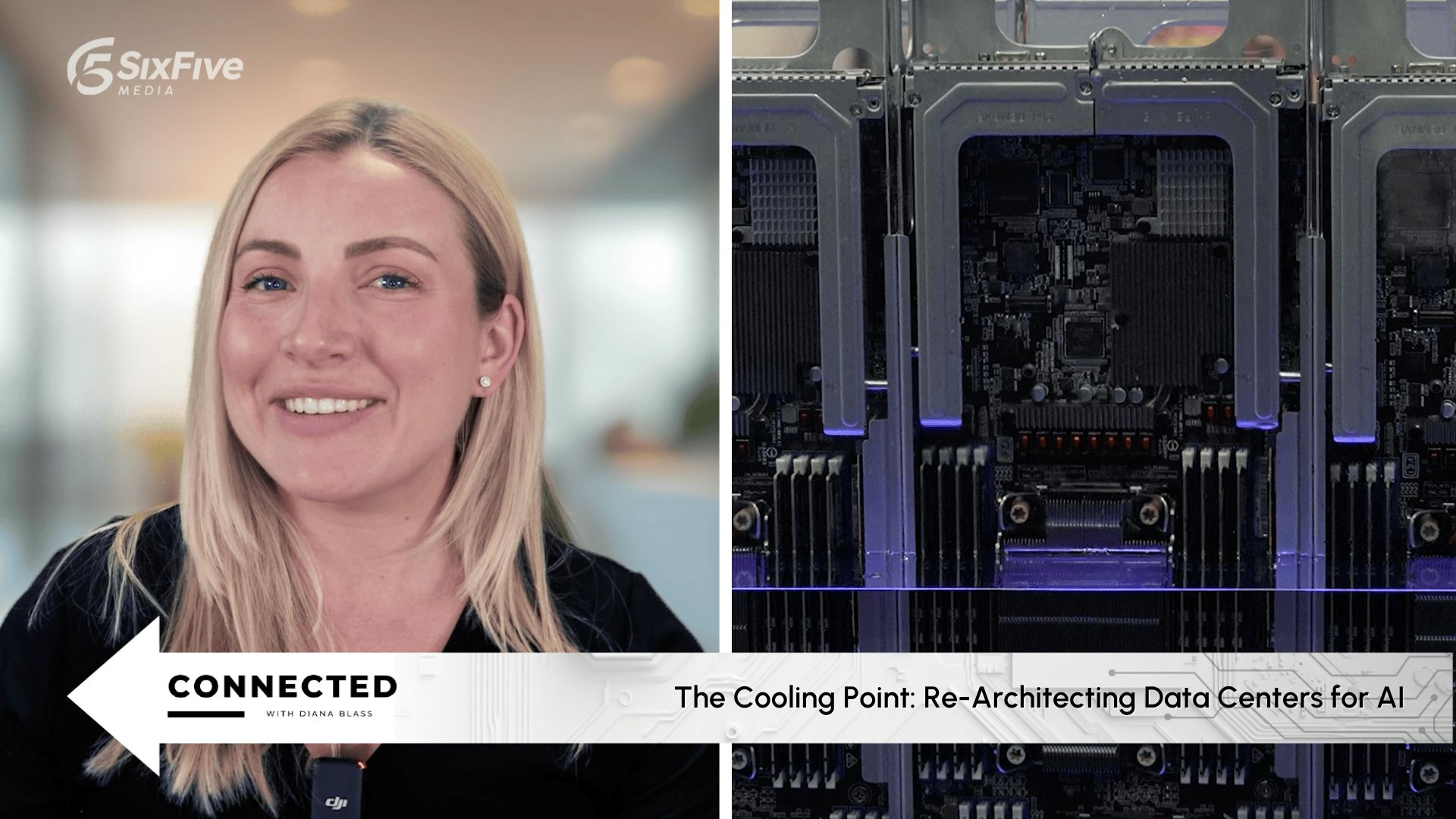
The Cooling Point: Re-Architecting Data Centers for AI - Six Five Connected with Diana Blass
Avi Shetty, Hecheng Han, Dr. George Zhang, Neil Edmunds, John Griffith, Josh Grossman, and Francesca Cain-Watson join Diana Blass to discuss the evolution of liquid cooling in AI systems, exploring design tradeoffs, architectures, and deployment strategies.

The Six Five Pod | Ep. 288: OpenAI’s Valuation Debate, Marvell’s Network Bets, and the Next Bottlenecks for AI Growth
This week, Patrick Moorhead and Daniel Newman unpack why today’s AI moment feels less like the endgame and more like Netflix’s DVD-by-mail phase—the very beginning of a transformation that will redefine the tech industry. They dig into soaring AI valuations and the growing debate over whether today’s leaders signal durable platforms or bubble dynamics, then shift to what really matters under the hood—AI infrastructure, with a sharp focus on networking and memory, informed by insights from Marvell’s Industry Analyst Day. This episode also breaks down recent market moves across major tech players, before closing with a forward-looking take on where AI is headed and what it will take to stay competitive as the pace of change continues to accelerate.
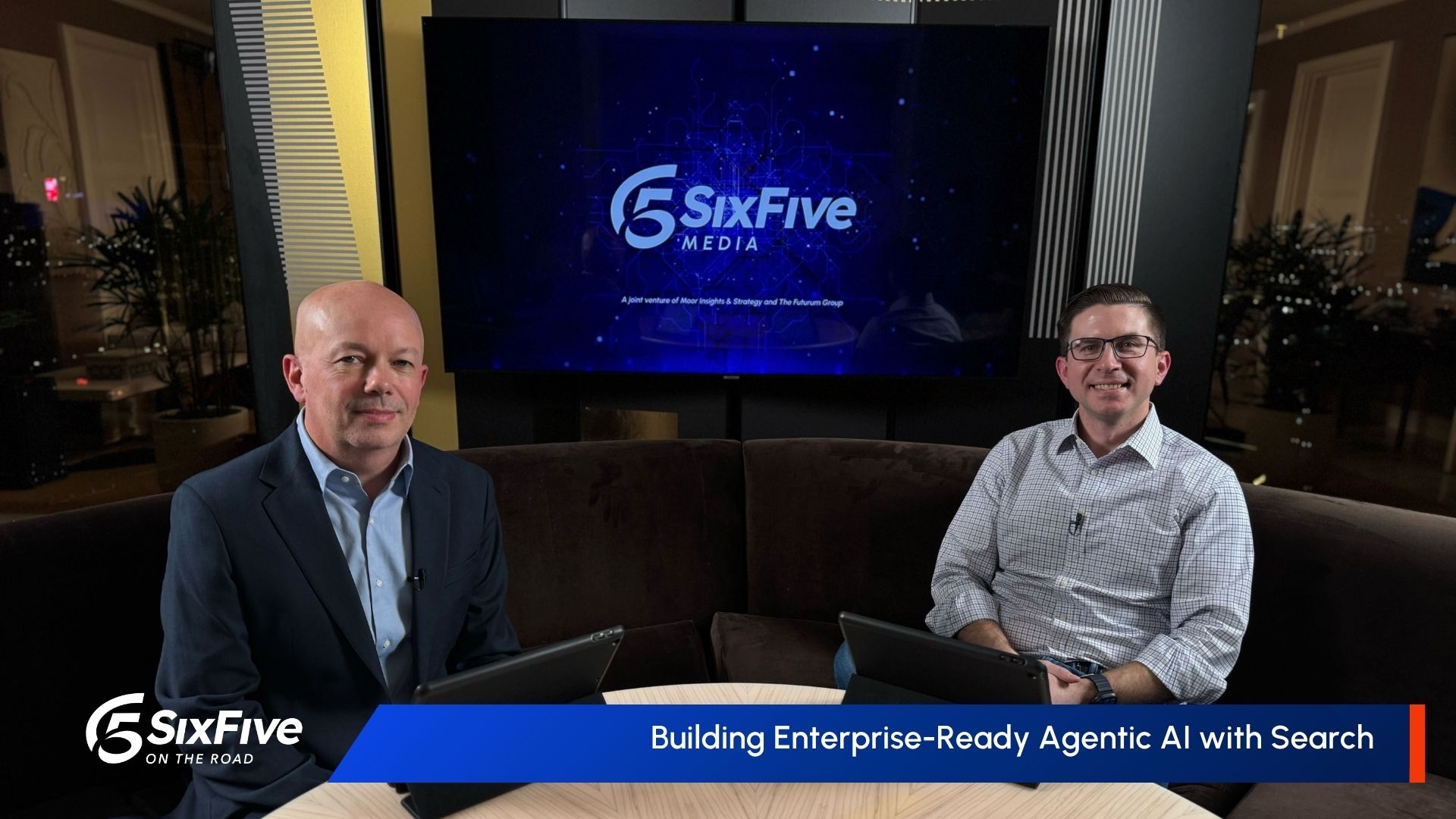
Building Enterprise-Ready Agentic AI with Search - Six Five On The Road
Steve Kearns, GM of Search Solutions at Elastic, joins Nick Patience to share how Elastic is enabling enterprises to move from RAG to agentic AI, solving operational challenges, and powering the next generation of autonomous workflows.
Other Categories
CYBERSECURITY
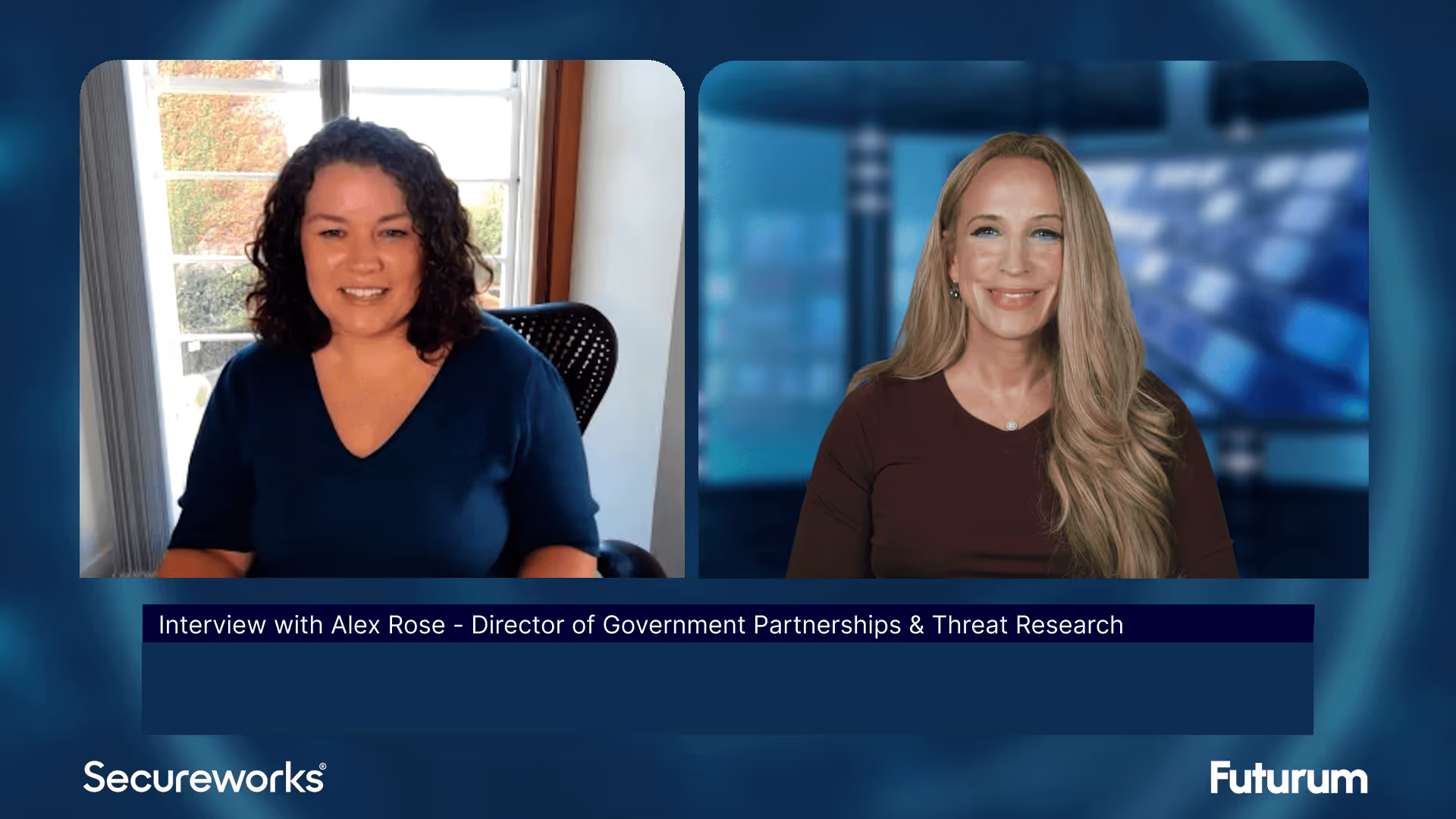
Threat Intelligence: Insights on Cybersecurity from Secureworks
Alex Rose from Secureworks joins Shira Rubinoff on the Cybersphere to share his insights on the critical role of threat intelligence in modern cybersecurity efforts, underscoring the importance of proactive, intelligence-driven defense mechanisms.
QUANTUM
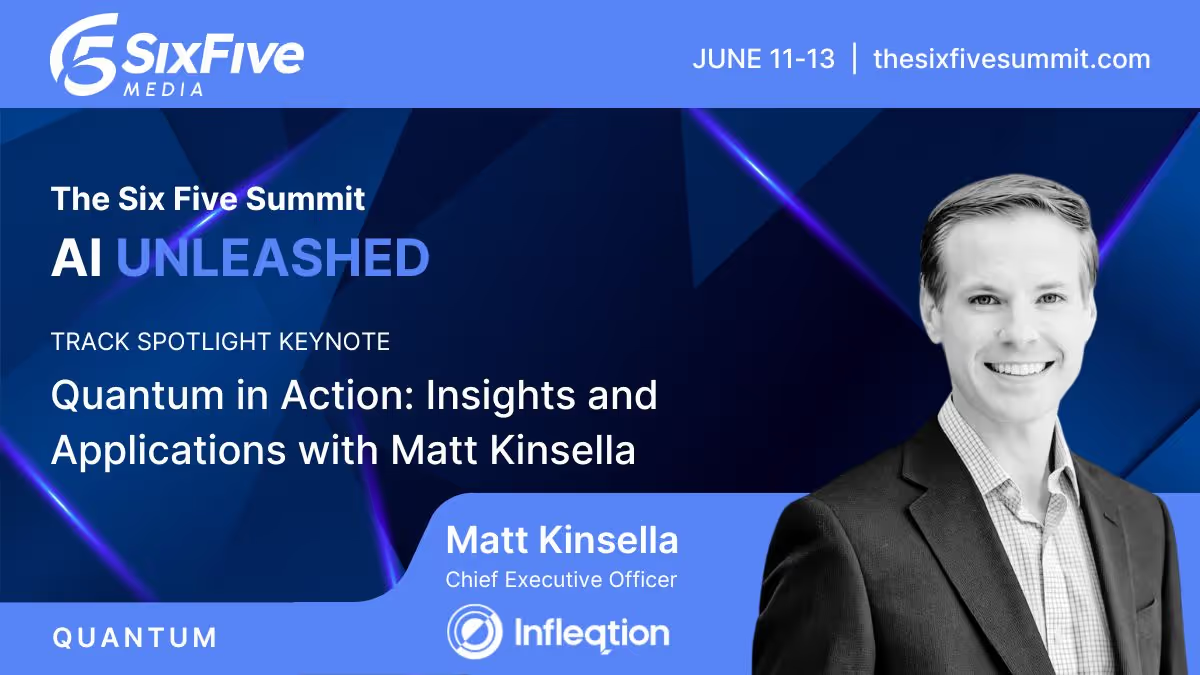
Quantum in Action: Insights and Applications with Matt Kinsella
Quantum is no longer a technology of the future; the quantum opportunity is here now. During this keynote conversation, Infleqtion CEO, Matt Kinsella will explore the latest quantum developments and how organizations can best leverage quantum to their advantage.
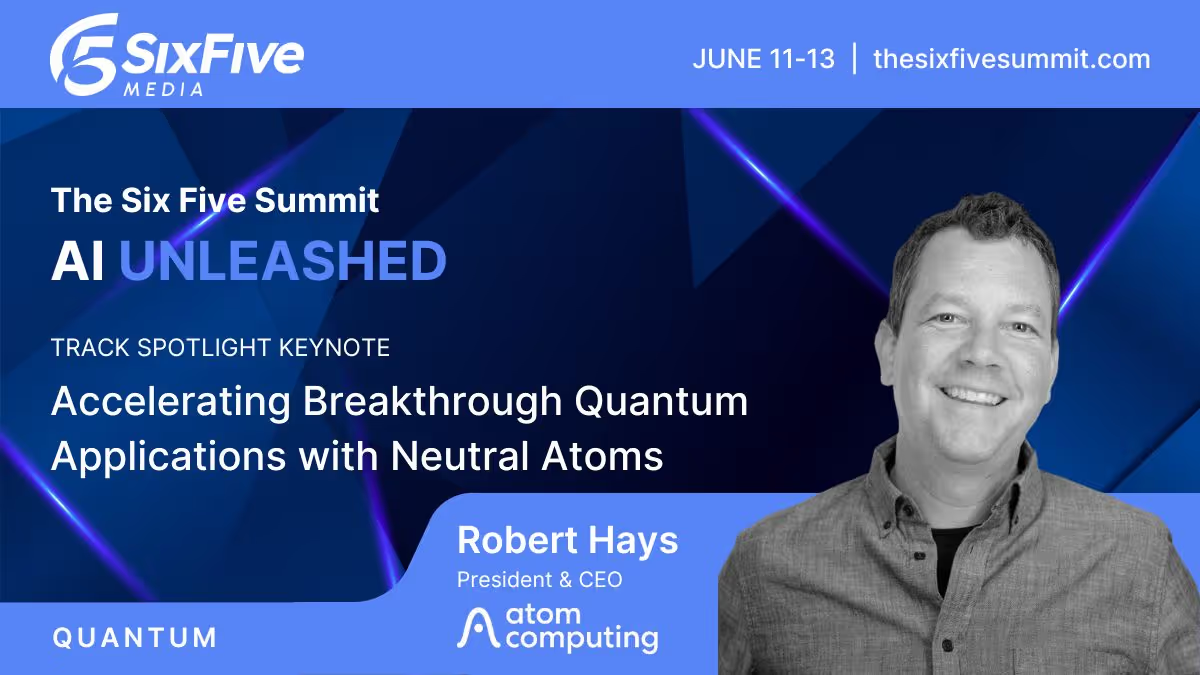
Accelerating Breakthrough Quantum Applications with Neutral Atoms
Our planet needs major breakthroughs for a more sustainable future and quantum computing promises to provide a path to new solutions in a variety of industry segments. This talk will explore what it takes for quantum computers to be able to solve these significant computational challenges, and will show that the timeline to addressing valuable applications may be sooner than previously thought.




